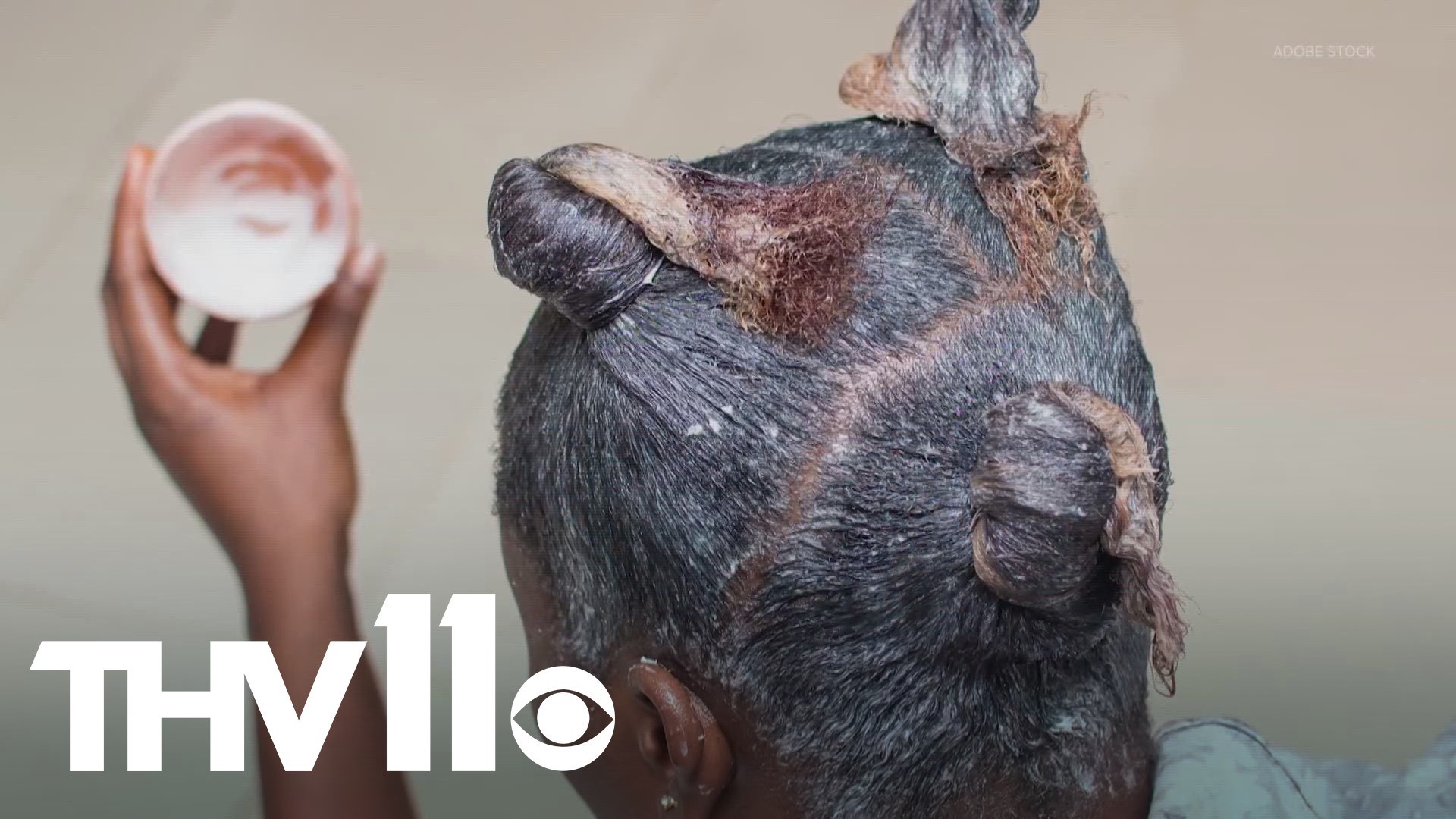LITTLE ROCK, Ark. — For years there has been a constant battle between women and hair straightening companies. Some women have come forward with concerns that they have with some hair straightening products also known as "relaxers."
They have said that those products release a formaldehyde gas which is a known human carcinogen.
"It'd be a little tingly and burn a little, but when we got done, she put our hair in these cute little twists and then bows and stuff that we got to pick out," said Brandey Christian as she described the memories of her hair being done.
Christian said she unlocked a core memory from her childhood, as she reflected on pictures. Those photos reminded her of when she used to sit still for hours on end while her mother did her and her sibling's hair.
One question that has constantly run through Christian's mind is her mother asking if it burned while she began to apply the relaxer to straighten her hair.
"A relaxer has been out for as long as I've known. You know, it was always you just had to have straight hair," Christian described.
After two decades of this routine, Christian is now a hairstylist herself. She has since learned the shocking truth about how something she did for years could possibly have long-term effects on her health.
"That's the scary part because we don't know when it will affect us. Like it could be five years from now, ten years from now, we just don't know," Christian explained.
Hair straightening products are something that have been a staple in Black communities for generations.
However, over the past few years, the Federal Drug Administration has warned that hair smoothing or straightening products actually release formaldehyde gas which is a known human carcinogen.
According to the FDA, the gas is released when the products are heated. If a room isn't well-ventilated then both the hair stylist and their client are at risk of inhaling the formaldehyde that is released into the air.
Frequent exposure to the formaldehyde gas that is released could lead to uterine cancer.
"In women who developed uterine cancer while on this study, if they had used a hair straightening product, they basically had double the risk of developing a uterine cancer compared to those women who didn't," said Dr. Heather Williams, a Gynecologic Oncologist at UAMS.
Dr. Williams explained how about 67,000 women in the United States are diagnosed with uterine cancer each year. Especially among Black women, there's been an alarming trend.
"We know that Black women are being diagnosed at more advanced stages of their cancer, and then also more frequently with those aggressive subtypes," Dr. Williams described.
A study by the National Cancer Institutes of Health estimates that around two percent of women who don't use hair straightening products will develop uterine cancer by the age of 70. However, for women who use them frequently that risk more than doubles to just over four percent.
"I was asking my clinic staff about it. Only one person out of three had heard of it before but they had all reported having their hair straightened, especially as teens," Dr. Williams explained.
In light of this, there are multiple lawsuits across the country with women who have been claiming that they've become sick because of hair products that contain formaldehyde.
"This is a tort claim and this will be considered a mass tort, meaning that it happened to a lot of people. So with the tort claim, basically, you're arguing that somebody owed a duty to the public or to whoever they injured, and they failed to meet their duty," said Maximillan Sprinkle, an attorney in Little Rock.
Sprinkle explained how many of these lawsuits are in the discovery phase where the plaintiffs are asking for information from companies to prove their case. However, he emphasized that when it comes to proving that a company allegedly knowingly added formaldehyde to their product— that's where it gets difficult.
"So, they fail to warn about potential dangers that they knew about, or that they should have known about, or they fail to research and do the things that they should have done before releasing the product. Therefore it injured somebody, and that makes them liable," Sprinkle explained.
Current research still doesn't directly tie uterine cancer to hair products that contain formaldehyde but right now the FDA is considering a proposed rule to ban the sale of the hair straightening products.
"The thing is, if they banned it today, we're still going to see the effect for years to come because of all the past use. Our bodies kind of accumulate to this DNA damage over time," Dr. Williams described.
Until a ban happens Dr. Williams said the best solution is to bring awareness to uterine cancer and to continue to monitor the research.
"I mean, the real answer is probably that it's a combination of all of these things and we really need to just as a society start with educating," she added.
The FDA has a few tips people should know about:
- Be sure to read labels. If a product does not have a list of the ingredients, then it is recommended that you do not buy it.
- Ask your hair stylist if the products that they're using contain formaldehyde.
- Report any symptoms you have from using hair straightening products that do contain it.
Christian said that her hope is to see change so that other women don't have to worry about this health risk.
"I would want to see [change] come out of it. For them to reiterate, reinvent [do] whatever they have to do to make this relaxer safe," Christian added.

